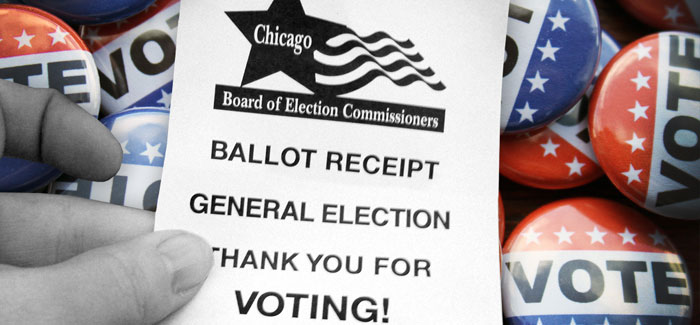
(Photo collage by Joy Olivia Miller)
Amassing data on candidates nationwide, a new UChicago start-up helps voters navigate their local ballots.
“In my mind when it first became an official thing was when we all met at Jimmy’s,” says Sebastian Ellefson, AB’03, recalling the early days of BallotReady, the start-up he joined last summer. Coming up with that name was all that he and his fellow cofounders accomplished on that day over drinks, but less than a year later they would find themselves with David Axelrod, AB’76, on their board of directors and a $30,000 grant from the University. BallotReady is an online database that compiles research on political candidates, with an emphasis on those running for local offices.
The idea originated with Alex Niemczewski, AB’09, on Election Day 2010 in Chicago. “There were over a hundred candidates on my ballot; I knew who to vote for for governor, maybe treasurer,” she says. But below that she needed help. Drawing on her experiences in the tech world (since graduating, she has taught web development classes for Chicago Booth among other pursuits), Niemczewski saw her answer in data. “I started doing my own research, which took a lot of time, so I started making a very simple prototype.” That prototype was a website, a sort of encyclopedia of political candidates. But not just presidential candidates and congressmen. The focus of BallotReady would instead be on scrutinizing the unheralded but influential aldermen, judges, and school council members who shape the day-to-day lives of cities and towns. And yet these politicians remain relatively anonymous. The media mostly focuses on higher level politics. BallotReady aims to fill that gap, providing information such as voting records, statements, and local news coverage to give citizens a fuller picture of just who they are voting for.
The idea is to create a more informed electorate by compiling vast and disparate data and making it accessible on one platform. Users can look up all the candidates in their area and, using the research available, decide who to vote for before approaching a ballot. “It’s so much information and what [some] people find useful might be different from what you or I find useful,” says Aviva Rosman, AB’10, one of BallotReady’s three founding members. “This is a tool that people say, whenever we talk to them, ‘Yes, this is something I need.’” BallotReady’s founders hope the project can work toward greater social good, and the University seems to have faith in the idea, awarding BallotReady first place in the 2015 Social New Venture Challenge program.
A 2011 spin-off from Chicago Booth’s New Venture Challenge, which began in 1996 to help student-entrepreneurs launch new companies, the Social New Venture Challenge is geared specifically toward tech start-ups with a focus on public service and social impact. Rosman’s interests in electoral politics go back a long time. She grew up in Massachusetts, and she recalls her father bringing her as a young child to New Hampshire to knock on doors for candidates during primary season. In high school she traveled as far as Florida to canvas for John Kerry’s 2004 presidential campaign. Now entering her second year at the Chicago Harris, Rosman says, “This is something I care about, it’s in my blood.” Rosman was the first person Niemczewski called with her idea; the two were friends from their undergrad years in Tufts House. The second call was to Ellefson, who after graduating from the College had returned to his home state of Minnesota to study law. But as the city’s four stars tattooed on his arm attest, Chicago has a way of drawing him back. “In my experience Chicagoans seem more politically active than your average urbanite,” he says. “Everyone seems to know who their alderman is. They really know the answer to fix [their] grievances is through politics.”
But BallotReady’s ambitions extend beyond its city of origin. Set to go live in time for this year’s election cycle, it will cover local races in Kentucky, Indiana, and Virginia, with research conducted through partnerships with universities in those states. Next year Niemczewski, Rosman, and Ellefson hope to cover several more states in addition to national races. Although they acknowledge that the expensive campaigning of the presidential and congressional races threatens to drown out the smaller elections, they are optimistic that in addition to increasing voter awareness about local candidates, they can also make headway against the big money being spent on elections. “There’s going to be a lot of voter engagement,” says Niemczewski, “We think it’s an opportunity for us to talk to local people who might get ignored.” As Rosman puts it, “One thing we’re hoping is that we can level the playing field a little. Big-funded candidates, candidates with no money, everyone can have their bio and their issues and people can vote based on that.”
